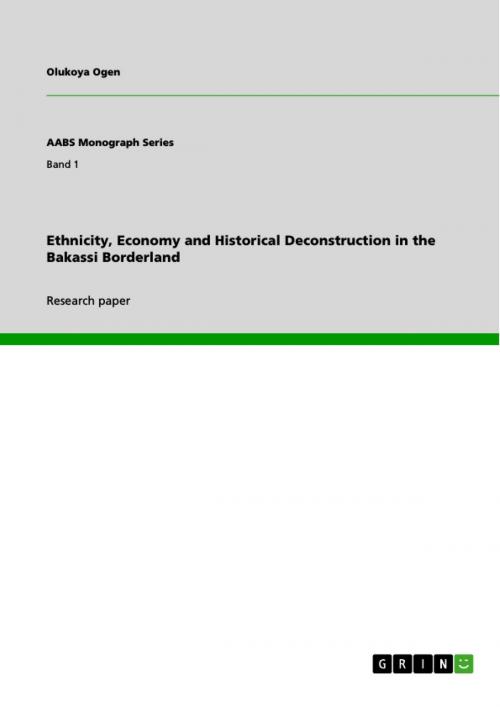Ethnicity, Economy and Historical Deconstruction in the Bakassi Borderland
Nonfiction, History, Africa| Author: | Olukoya Ogen | ISBN: | 9783656152088 |
| Publisher: | GRIN Publishing | Publication: | March 14, 2012 |
| Imprint: | GRIN Publishing | Language: | English |
| Author: | Olukoya Ogen |
| ISBN: | 9783656152088 |
| Publisher: | GRIN Publishing |
| Publication: | March 14, 2012 |
| Imprint: | GRIN Publishing |
| Language: | English |
Research Paper (undergraduate) from the year 2012 in the subject History - Africa, grade: none, , course: African Borderland History, language: English, abstract: This study offers a compelling revision of the meagre Nigerian historiography on the Bakassi Peninsula. It argues that Nigeria's claim of ownership of the Peninsula is logically indefensible and historically unsustainable. It contends further that Efik irredentism which found its expression in Nigeria's attempt to forcefully annex the Bakassi Peninsula is based on historical claims that are in reality largely ahistorical. The study is of the opinion that Nigeria's occupation of, and attempts to exercise sovereignty over the Peninsula emanated from the predictable desire of the Nigerian ruling elite to appropriate Bakassi's abundant natural resources and the strategic advantage that the Peninsula holds for Nigeria's oil interests in the Gulf of Guinea. This study further analyses the border-cum-migration problematics that prevail in the Peninsula. It argues that patterns of migrant life rooted in historic and still functioning socio-cultural and economic networks persist in defiance equally of national and international agreements and political claims to ethnic solidarity. The study concludes that peace can only be guaranteed in the Bakassi Peninsula, and indeed in virtually all conflict prone African borderlands, if African governments respect the old 'glass houses rule' (i.e. the 1964 Cairo Declaration by the OAU) and acknowledge that colonial treaties and national borders, irrespective of their arbitrariness and artificiality, constitute the foundation of all modern African state structures.
Research Paper (undergraduate) from the year 2012 in the subject History - Africa, grade: none, , course: African Borderland History, language: English, abstract: This study offers a compelling revision of the meagre Nigerian historiography on the Bakassi Peninsula. It argues that Nigeria's claim of ownership of the Peninsula is logically indefensible and historically unsustainable. It contends further that Efik irredentism which found its expression in Nigeria's attempt to forcefully annex the Bakassi Peninsula is based on historical claims that are in reality largely ahistorical. The study is of the opinion that Nigeria's occupation of, and attempts to exercise sovereignty over the Peninsula emanated from the predictable desire of the Nigerian ruling elite to appropriate Bakassi's abundant natural resources and the strategic advantage that the Peninsula holds for Nigeria's oil interests in the Gulf of Guinea. This study further analyses the border-cum-migration problematics that prevail in the Peninsula. It argues that patterns of migrant life rooted in historic and still functioning socio-cultural and economic networks persist in defiance equally of national and international agreements and political claims to ethnic solidarity. The study concludes that peace can only be guaranteed in the Bakassi Peninsula, and indeed in virtually all conflict prone African borderlands, if African governments respect the old 'glass houses rule' (i.e. the 1964 Cairo Declaration by the OAU) and acknowledge that colonial treaties and national borders, irrespective of their arbitrariness and artificiality, constitute the foundation of all modern African state structures.















